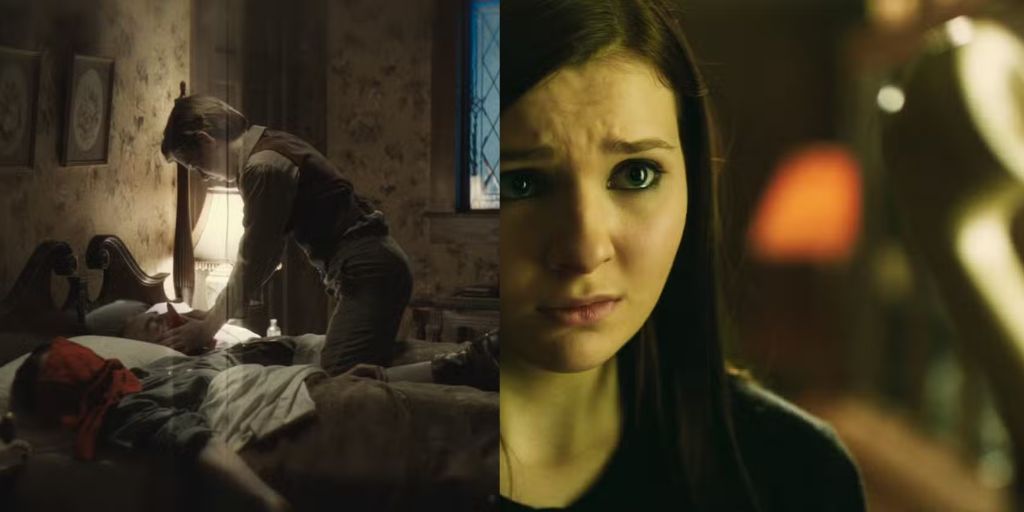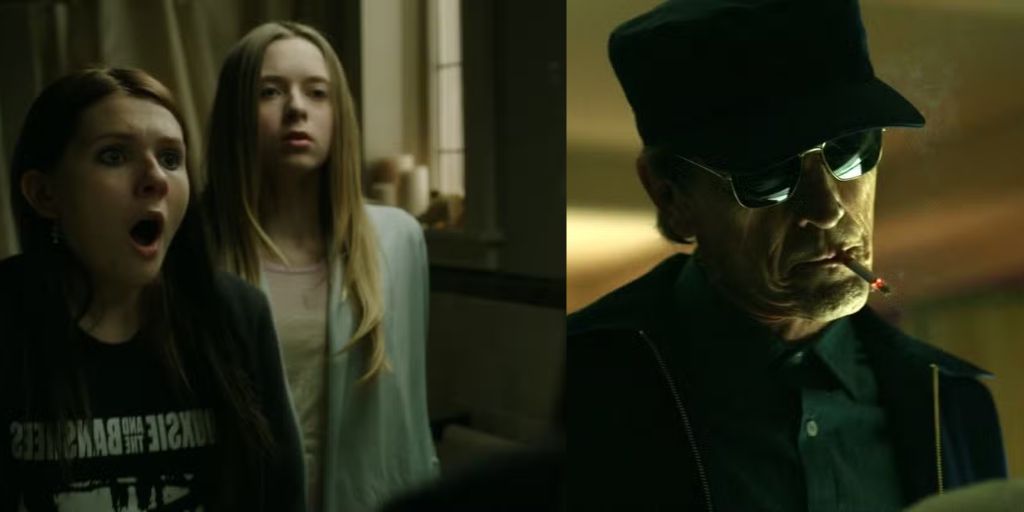In 2013, the supernatural horror film Haunter was released with little attention. It was directed by Vincenzo Natali and starred Abigail Breslin and Stephen McHattie. This film deserved more recognition, but it remained unnoticed for a few reasons. First, it had only a limited release after premiering at the SXSW Film Festival.
Second, horror fans at that time seemed more interested in movies about demons and mythical creatures rather than ghost stories. Popular films like The Conjuring, Mama, and Evil Dead focused on these themes, leaving Haunter overshadowed.
At first glance, Haunter appears to follow the typical haunted house formula. The movie introduces a family of four: a mother, a father, a teenage daughter, and a younger son. They are inside their home on a foggy day, and something feels off.
At this point, the setup looks familiar, as many horror movies begin the same way. However, within the first ten minutes, the story takes an unexpected turn. It is revealed that the entire family is already dead, and they are stuck reliving the same day over and over again.
The only person aware of this eerie situation is the teenage daughter, Lisa (played by Abigail Breslin). She realizes that they are trapped in a loop, repeating the day they were murdered.
A New Take on a Familiar Twist
The idea of characters discovering they are dead is not new in horror. Films like The Sixth Sense and The Others used this plot twist effectively. However, those movies kept the reveal for the ending. Haunter does something different—it presents this revelation early in the story.
This allows the film to focus on other mysteries. How did the family die? Why are they stuck in this endless cycle? Why is Lisa the only one who notices their strange reality? Who is the mysterious man seen in an old home video?
The movie turns into a supernatural mystery, with Lisa determined to solve the puzzle of her own death. As the story unfolds, the audience becomes more connected to the family. The film takes advantage of Lisa’s teenage perspective, making her a relatable and strong protagonist.
Even though Lisa is a ghost, she still faces common teenage struggles. This adds humor and emotion to the story. She is frustrated that she died just before her 16th birthday, which already makes her situation difficult. On top of that, she must deal with family problems.
Her mother constantly nags her about chores, her father behaves strangely, and her younger brother prefers playing with his imaginary friend. Her family members believe she is the one acting strangely, blaming it on typical teenage mood swings.
Lisa’s character is well-developed. She wears a Siouxsie and the Banshees t-shirt, which not only hints at the time period they died in but also shows her rebellious nature. She questions authority and refuses to accept things as they are. This makes her more believable as a teenager and a strong lead for the film.
Being Dead Is Not the Worst Thing in Haunter
Even with all these eerie elements, the movie could have felt predictable if the stakes were not high enough. Lisa herself wonders, “We’re already dead, so how much worse can it get?” The film quickly proves that things can, in fact, get much worse.
Director Vincenzo Natali, known for films like Cube (1997) and Splice (2009), is skilled at creating psychological horror with deeper themes. Haunter brings in existential fear, making Lisa’s situation even more terrifying.
Stephen McHattie, who plays a mysterious and chilling figure, enters the story and makes things even darker. His presence threatens Lisa with the idea of eternal loneliness. This raises the emotional stakes significantly.
As the story develops, a surprising new element is introduced. The film reveals that people from different timelines exist in the same house simultaneously.
Lisa’s family, along with the spirits of previous victims, share their space with the living family currently residing there. This means the killer’s cycle of murder is about to repeat. Lisa must act before another innocent family meets the same fate.
This twist is similar to the concept used in Steven Soderbergh’s recent film Presence, which also plays with non-linear time.
While Haunter does not put the audience in the direct perspective of a ghost, it does something equally clever. It gives Lisa, a supernatural being, real power and responsibility. She is not just a passive spirit trapped in the past—she has a chance to change the future.
A Horror Film Ahead of Its Time
Looking back at Haunter now, it is clear that the film was ahead of its time. It took a unique approach to the traditional ghost story and added a deep emotional layer. Today, horror movies often connect supernatural events to trauma, emotional struggles, and family problems. Haunter fits well into this modern trend, even though it came out before it became popular.
One of the film’s strongest themes is the cycle of domestic violence. While there is a supernatural reason behind the troubling behavior of the fathers in both families, the way their loved ones react is very realistic. The denial and excuses they make mirror real-life patterns of abuse.
The movie also presents a terrifying version of the afterlife. Instead of showing ghosts in a grand, mystical way, it makes their existence seem dull and repetitive. Being trapped in the same routine forever is a chilling thought.

The film cleverly highlights this horror with a simple but effective detail—Lisa’s family is forced to watch the same episode of Murder, She Wrote over and over again. This might seem ordinary, but in the context of the film, it is deeply unsettling.
Why Haunter Deserves More Recognition
Even though Haunter did not receive widespread attention, it remains a hidden gem in supernatural horror. It blends mystery, horror, and emotional storytelling in a way that feels fresh and engaging.
The early reveal that the family is already dead sets it apart from other films with similar themes. The movie also gives its ghostly protagonist real agency, turning her into a hero rather than just a victim.
The film effectively balances supernatural horror with psychological tension. It keeps the audience invested by presenting layers of mystery that unfold throughout the story. The combination of eerie atmosphere, strong performances, and unexpected twists makes Haunter a memorable watch.
For horror fans who enjoy films with more than just jump scares, Haunter offers something deeper. It is a story about life, death, and the power of breaking cycles. While it may have been overlooked upon release, it remains a must-watch for anyone looking for a supernatural thriller with heart and intelligence.






